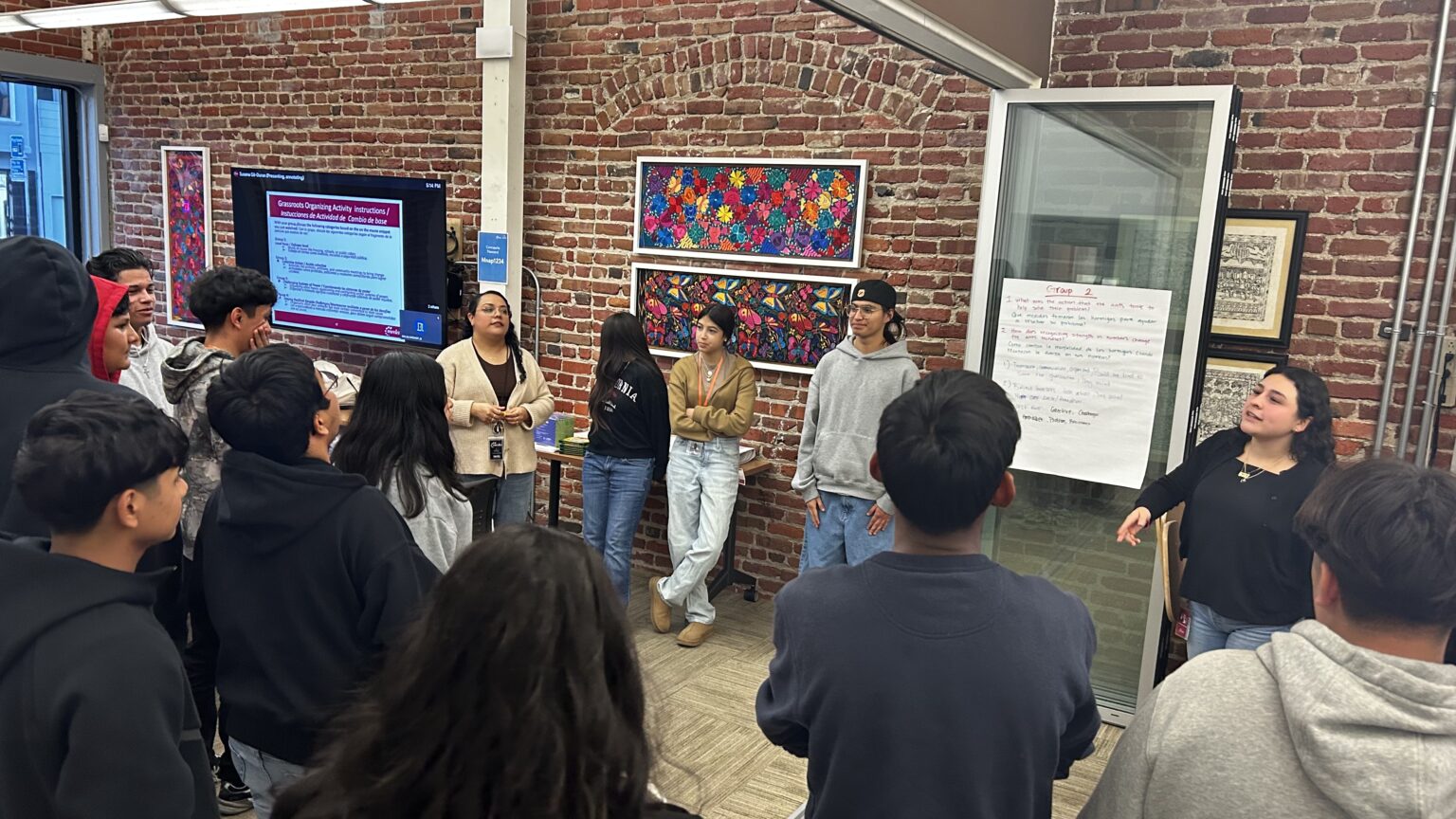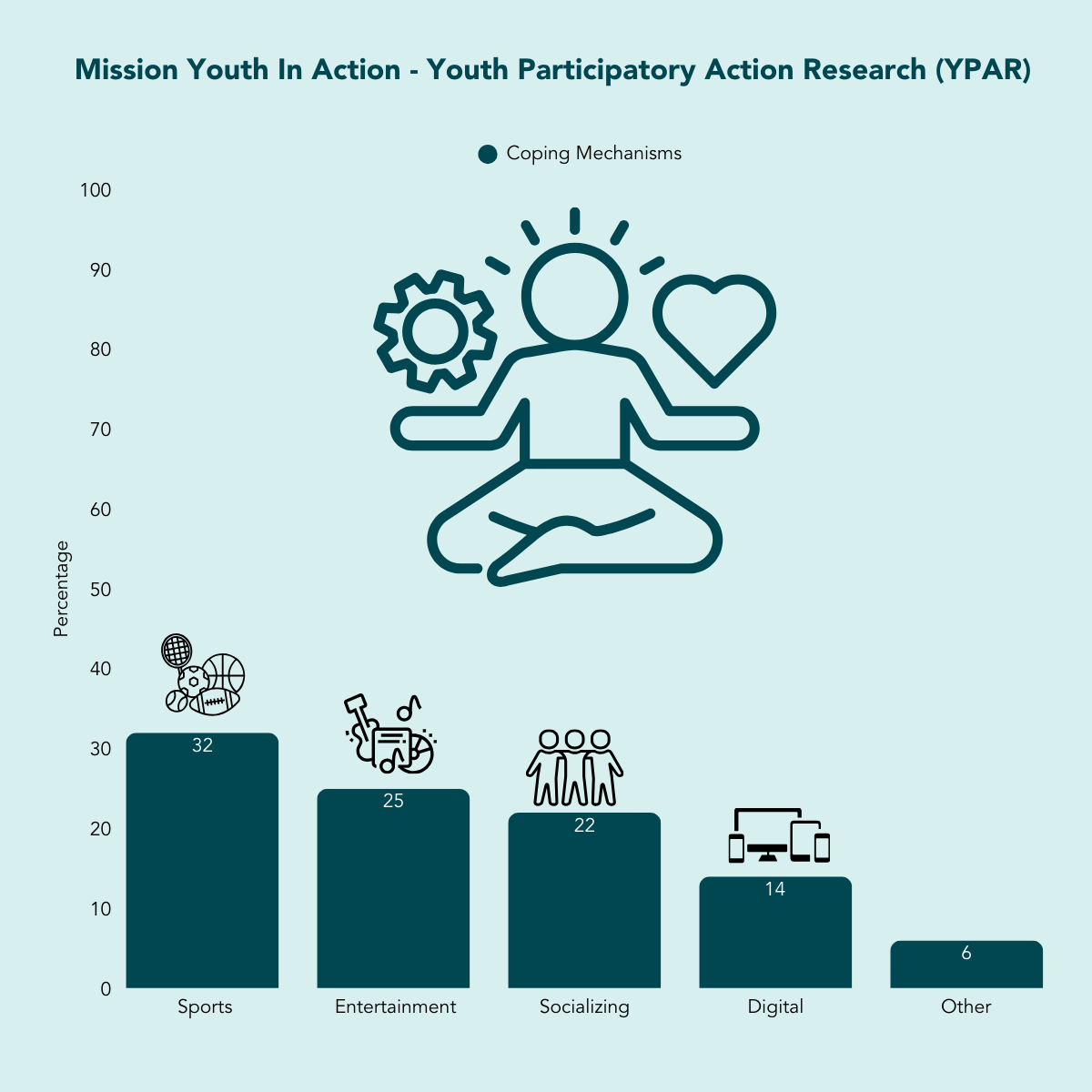Igniting Youth Leadership in the Mission District/h2>
Launched in 2024 with funding from San Francisco’s Department of Children, Youth, and Families, MEDA’s Mission Youth in Action (MYIA) program transforms high school students into powerful community advocates through a journey of self-discovery and empowerment. This inaugural MYIA cohort brought together 29 Mission-rooted youth leaders and 49 passionate youth volunteers to create positive change and spark critical conversations. Recognizing that youth expertise deserves compensation, cohort members received stipends—reaffirming our commitment to valuing young people’s contributions as essential community work.
MEDA would also like to acknowledge Susana Gil-Duran, Family and Youth Engagement Specialist; Crista Alarcón Luna, Community Organizer; and Alejandro Bautista Zugaide, Family Success Coach for pouring their energy, creativity, and dedication into making the MYIA program a tremendous success. Their commitment to creating an engaging environment, and serving as positive role models, has been incredible to watch. Thank you for making our the MYIA program a transformative experience for our community’s young people.

Over the course of nine months, participants turned shared community challenges into unified action, fostering collaborative spaces where youth developed leadership skills, conducted meaningful research, and inspired lasting change. With our first MYIA cohort concluding this past May, MEDA is proud to share the incredible impact these emerging leaders have made in our Mission District community.
Cultivating Resilience Through Self-Discovery
Recognizing the importance of emotional wellness during challenging times, MYIA youth participated in social and emotional learning, which is the process of developing skills to understand and manage emotions, build healthy relationships, and make responsible decisions. Pamela Lopez, a trauma-informed consultant, facilitated “The Story of Our Nervous System” activity, where youth outlined a tree to represent the different stressors in their lives, core values, and supportive relationships. Through this activity, youth gained deeper self-awareness and clarity about their growth journey.
Youth also created personal altars celebrating their heritage and identity, incorporating meaningful objects like childhood toys, traditional foods, and cultural attire. By sharing the stories behind each item, participants not only explored their roots and found new forms of self-expression, but also forged stronger connections with their peers while honoring their unique backgrounds and experiences.
Building Futures Through Personalized Support
At the heart of MYIA lies 1:1 success planning, where each youth partnered with an adult Navigator to craft personalized roadmaps celebrating their strengths and aspirations. Through monthly check-ins, youth and their Navigators explore academic progress, personal growth, goal-setting strategies, and meaningful milestones achieved along the way. This part of the program culminated with participants proudly sharing their goal-achievement journeys with the entire cohort, a powerful demonstration of what consistent support and self-advocacy can accomplish. Through this individualized approach, MYIA youth created lasting connections, dismantled barriers to success, and empowered themselves to reach their full potential.
Community Leaders in Action
MYIA youth actively strengthened their civic engagement through meaningful community actions that built collective knowledge and shared belonging. As a highlight of their leadership development, youth helped organize the first-ever bilingual District 9 community forum ahead of the 2024 November election, bringing together over 150 residents to hear from San Francisco Board of Supervisors candidates.
In December of last year, MYIA youth partnered with the Mission Promise Neighborhood (MPN) to host the 10th annual Book Giveaway at Buena Vista Horace Mann Community School, distributing over 250 books to ensure every child has access to reading and learning opportunities. Youth leaders also organized engaging, interactive activities that included bookmark crafting, holiday cutouts, DIY piggy banks, and a comic book station, while parents received valuable information about community resources. This work continued as MYIA later visited Sanchez Elementary to connect with younger students through reading sessions and interactive activities that fostered a shared love of learning.
MYIA participants concluded their community actions with a tour of MEDA’s affordable housing sites, discovering how these vital spaces support both local families and small businesses while strengthening the neighborhood’s cultural fabric. The tour culminated at Casa Adelante – 2828 16th Street, where youth explored the community hub housing organizations like Youth Speaks, First Exposure, and PODER—all dedicated to empowering residents and fostering collective action. This experience helped youth understand how affordable housing serves as more than shelter, creating interconnected spaces where community organizations work together to uplift and support Mission District residents of all ages.
Youth Research Drives Community-Led Solutions
A cornerstone of the MYIA program was utilizing a Youth Participatory Action Research (YPAR) framework to conduct community-based research, where youth take on active leadership roles, make decisions that guide the project’s direction, and create solutions to improve youth health outcomes. The YPAR framework mitigates feelings of hopelessness to build youth agency, collective power, and inspiration for the future. Rather than imposing predetermined topics, youth facilitated a series of discussions centered around civic engagement, issues impacting neighborhood health conditions, and contextualizing problems to define the project focus.
In 2024-2025, MYIA chose youth mental health as the research topic. To build their research capacity, youth received training on how to develop research tools, facilitate focus groups and collect data. Following this, youth divided themselves into three working groups to measure knowledge and misconceptions about youth mental health, efficacy of coping strategies, and barriers to support. Targeting primarily high school students in the Mission District, youth leaders facilitated focus group conversations to ask key research questions: What did you learn about mental health in school and outside of school? What do you do to manage your emotions during a challenging day? Do you think youth are reaching out for mental health support?
MYIA staff and youth leaders intentionally designed these focus group discussions to be welcoming and collaborative spaces. They incorporated interactive elements such as writing responses on post-its and grouping them thematically, while rotating youth facilitators to maintain peer-to-peer engagement. This approach had great success, creating a fun, engaging, and empowering environment where youth openly, and confidently, shared their knowledge and experiences.
Following this, youth used a narrative synthesis approach to summarize findings and develop community-informed policy recommendations that would have lasting benefits. The findings were insightful, highlighting that youth understand mental health stigma surrounding and generally know where to find resources. However, youth cited significant challenges when trying to access these resources, noting that school counselors do not always create welcoming environments, fear of burdening stressed parents, and not wanting to feel vulnerable in front of their friends and family.
“Some students think that they won’t get enough help and it won’t work for them”
For coping mechanisms, youth highlighted socialization and physical activity as their preferred method to relieve stress. More specifically, 22% of youth said they leaned on their friends when faced with a challenging day, and 32% said they went on walks or played sports. When asked about their ideal vision for the future, youth highlighted accessible mental health support, safe spaces for youth to explore creativity, and free social programs connecting youth with similar interests.

“In the future, we would like to see places that have nature like trees and plants and activities where youth can express themselves get emotional support to make decisions that are right for them”
Turning data into action, MYIA concluded the YPAR curriculum by presenting project findings to their peers, family, and community, starting critical dialogues about mental health conditions in the community. These spaces fostered a shared sense of belonging, and laid the foundation for a youth-led movement in the Mission District. Heading into the future, MEDA is firmly grounded in the belief that lasting change results from community-rooted initiatives, disrupting top-down decision-making structures and amplifying community voices to co-create solutions.
Takeaways From Youth Leaders
Participants described MYIA as a space where they felt supported, encouraged, and motivated to grow. They shared how the program helped them set and achieve goals, build routines, and organize their time. Many valued the safe environment to express themselves openly, receive guidance, and gain confidence through affirmations and encouragement. Their words capture the program’s impact:
- Goal-setting and Organization
“Me ayudaron a tener metas así como a largo plazo y corto plazo. Me ha ayudado a desenvolverme y tener metas por delante.”
(They helped me set both short- and long-term goals. It helped me develop myself and have goals ahead of me.)
- Emotional Support and Safe Spaces
“Me preguntaron cómo me sentía y era un espacio seguro donde podía expresarme.”
(They asked me how I felt and it was a safe space where I could express myself.)
“Es un espacio donde te van a aconsejar y no le contaron nada a nadie.”
(It’s a space where they advise you and they didn’t tell anyone what I said.)
- Practical support for school and daily life
“Me ayudó en la parte de levantarme temprano para poder llegar más rápido a la escuela y no estar retrasado y usar la alarma para poder levantarme temprano.”
(It helped me wake up early so I could get to school faster, not be late, and use an alarm to wake up on time.)
Together, these reflections show how MYIA creates not only a supportive and trusting environment, but also equips participants with the tools, habits, and confidence to succeed in their personal and academic lives.
A Legacy of Leadership and Looking Ahead
Our inaugural MYIA cohort has achieved remarkable milestones—from developing essential social and emotional skills to conducting critical youth-led research that will improve community health outcomes. Through meaningful community service, advocacy initiatives, and collaborative learning experiences, these young leaders have demonstrated the power of investing in youth-driven programs. We’re confident they will continue championing their communities, deepening peer connections, and driving positive change.
As we prepare to welcome our 2025-2026 MYIA cohort this fall, MEDA remains steadfast in our commitment to cultivating the next generation of leaders. Guided by our vision of Mission District residents becoming decision-makers in the institutions that shape their lives, we’re creating collaborative spaces where individual concerns transform into collective action. The foundation has been set, and we’re excited to witness the innovative solutions and powerful advocacy the next cohort will bring to our community.



